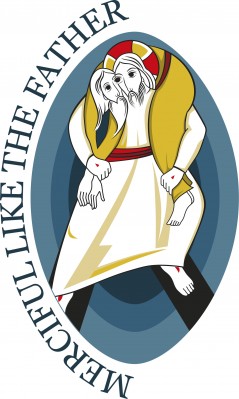 Pope Francis has declared an Extraordinary Jubilee, a Holy Year of Mercy (December 8, 2015–November 20, 2016) that “the Church might make clear its mission of being a witness to mercy” by living the Lord’s words, “Be merciful, just as your Father is merciful.”[i] This is no surprise: Francis is a pope who both receives and gives mercy and whose motto is Miserando atque eligendo (which is taken from the homilies of Venerable Bede on St. Matthew’s Gospel relating to Matthew’s call: [Jesus]…by having mercy, chose him…). In the same vein, St. John Paul II wrote an encyclical to highlight God’s merciful mission of love. In it, he writes, “God, who is rich in mercy, out of the great love with which he loved us, even when we were dead through our trespasses, made us alive together with Christ … Openness to Christ… can only be achieved through an ever more mature reference to the Father and his love… We know God above all in his relationship of love for man: in his ‘philanthropy.’”[ii] Pope Benedict XVI wrote two encyclicals on love and invited us to “learn to carry one another” like the Good Shepherd who seeks and finds and gently and jubilantly carries his beloved lost sheep home. This love characterizes the hearts of missionary disciples, that is, Christians who have experienced the love of God and share the joy of the Gospel with the weary, the forgotten, the lost, and the “unlovable.” He also spoke of the existence of deserts and the need for evangelistic love: “So many people are living in… so many kinds of deserts… the desert of poverty… hunger and thirst... abandonment… loneliness… destroyed love… of God’s darkness, the emptiness of souls no longer aware of their dignity or the goal of human life.” We must “set out to lead people out of the desert, towards the place of life, towards friendship with the Son of God.”[iii] Each of these three popes has believed that the mission of the Redeemer, and thus our mission, is to reveal the love of God made manifest in Jesus Christ. Why love? Because God is Love in search of man! God created us through love and for love, to be loved and to love, just as the Triune God exists from eternity to eternity in a perfect and personal communion of love. He invites us to experience and share that love with others. This is indeed humanity’s greatest capacity, our most important responsibility—our fundamental and innate vocation![iv] Yes, our highest calling is to receive and to reveal love—as we, by God’s grace, are perfected in it.[v]
Pope Francis has declared an Extraordinary Jubilee, a Holy Year of Mercy (December 8, 2015–November 20, 2016) that “the Church might make clear its mission of being a witness to mercy” by living the Lord’s words, “Be merciful, just as your Father is merciful.”[i] This is no surprise: Francis is a pope who both receives and gives mercy and whose motto is Miserando atque eligendo (which is taken from the homilies of Venerable Bede on St. Matthew’s Gospel relating to Matthew’s call: [Jesus]…by having mercy, chose him…). In the same vein, St. John Paul II wrote an encyclical to highlight God’s merciful mission of love. In it, he writes, “God, who is rich in mercy, out of the great love with which he loved us, even when we were dead through our trespasses, made us alive together with Christ … Openness to Christ… can only be achieved through an ever more mature reference to the Father and his love… We know God above all in his relationship of love for man: in his ‘philanthropy.’”[ii] Pope Benedict XVI wrote two encyclicals on love and invited us to “learn to carry one another” like the Good Shepherd who seeks and finds and gently and jubilantly carries his beloved lost sheep home. This love characterizes the hearts of missionary disciples, that is, Christians who have experienced the love of God and share the joy of the Gospel with the weary, the forgotten, the lost, and the “unlovable.” He also spoke of the existence of deserts and the need for evangelistic love: “So many people are living in… so many kinds of deserts… the desert of poverty… hunger and thirst... abandonment… loneliness… destroyed love… of God’s darkness, the emptiness of souls no longer aware of their dignity or the goal of human life.” We must “set out to lead people out of the desert, towards the place of life, towards friendship with the Son of God.”[iii] Each of these three popes has believed that the mission of the Redeemer, and thus our mission, is to reveal the love of God made manifest in Jesus Christ. Why love? Because God is Love in search of man! God created us through love and for love, to be loved and to love, just as the Triune God exists from eternity to eternity in a perfect and personal communion of love. He invites us to experience and share that love with others. This is indeed humanity’s greatest capacity, our most important responsibility—our fundamental and innate vocation![iv] Yes, our highest calling is to receive and to reveal love—as we, by God’s grace, are perfected in it.[v]
On A Truth-Bearing Mission of Love and Mercy
Desert-minded mercy-giving requires tenderness of heart and the empathy characteristic of incarnational love. For example, after hugging a weeping 12-year-old child who had been living on the streets in Manila, Francis asked, “Can I weep when I see a child who is hungry, on drugs and on the street, homeless, abandoned, mistreated or exploited as a slave by society? Or is my weeping the self-centered whining of those who weep because they want to have something else? … Let us learn to weep… Jesus wept.”[vi] The sensitivity he describes is necessary for all human love and in each evangelistic encounter. God has not given up on this faithless generation (Mk 9:14-29). Nor can we. Our confused contemporaries need a love that reveals God. We must love people back to health, wholeness, and holiness. People the world over need to hear and see how deeply and dearly, mercifully and intimately loved they are by God and by the Church that represents him on earth, if they are to believe in and reach the God of heaven. Christ and his vicar know what love and lack of love can and will do to humanity. Lack of true love is killing us—figuratively and literally. Lack of love is…
- …Hurting people who go on to hurt (even harm and kill) themselves and others.
- …Locking people in patterns of selfishness and sin.
- …Keeping people from comprehending and embracing the truth about God and man, good and evil, love and freedom, marriage and family, sexuality and the moral act, human life and eternal life.
- …Hardening hearts and feeding the globalization of indifference and throw-away culture.
- …Reinforcing the tyranny of relativism and the dictatorship of secularism and the demands of a new intolerance imposing itself as a new religion.
- …Preventing millions from accessing the gift of God as they, like the Samaritan woman, look for love and meaning in all the wrong wells with buckets that should not be on their list.
It comes as no surprise: “Man cannot live without love. He remains a being that is incomprehensible for himself, his life is senseless, if love is not revealed to him, if he does not encounter love… (and) participate intimately in it.”[vii] Thanks be to God, Christ’s love reveals man to man Himself—through us!
Sheep-Smelling Love Encounters
The peripheries pope explains what happens in a world pervaded by consumerism, covetousness and complacency, frivolous pleasures and a blunted conscience: “our interior life becomes caught up in its own interests and concerns, there is no longer room for others… God's voice is no longer heard, the quiet joy of his love is no longer felt, and the desire to do good fades.”[viii] Thus, there is a need for re-proposing the kerygmatic call to a “personal encounter with the saving love of Jesus” that generates faith and leads to truth, goodness, and beauty.[ix] The success of the New Evangelization will depend greatly on how well we truly love and how convincingly we show that love to others as merciful truth-bearing love messengers who mingle with lost, wounded, smelly fellow sheep. We must believe that love and mercy can lead to contrition and repentance, forgiveness and conversion. Without new evangelizers who so embody Jesus’ love for his people that they “smell like the sheep,” the Church’s apostolic initiatives will bear little fruit among the secularized, hardened, and confused people, even within the Church, who are starved for love. Paradoxically, the more we smell like sheep, the greater the chance we will see how God “through us spreads in every place the fragrance that comes from knowing him. For we are the aroma of Christ” (2 Cor 2:14-17). The 2015 World Meeting of Families preparatory catechesis reminds us that this mission of love “is the only way we can be fully alive and be who we are created to be” and that “love should be taught, shared, and communicated in and through the family, the domestic church.”[x] Indeed, love-mercy must be perfected in the family, “the first school of Christian life,” and constantly offered to the world from the “family of families,” the Church.[xi]
Duc in altum!
If we wish to let down our nets for an obedience-testing, vision-expanding, faith-stretching, trust-strengthening, team-building, space-enlarging, net-busting, boat-sinking miraculous catch with and for Christ (cf. Lk 5), we will need to put out into the deep reservoir of merciful love. May all Christians learn to master the language of mercy as “witnesses to love” who are convinced that “love is truly the ‘heart’ of the Church” and make “a commitment to practical and concrete love for every human being.”[xii] We might ask ourselves, with utter honesty and docility, do I wholeheartedly believe in the transforming power of God’s extravagant love and assent to the lengths to which God will go, and asks me to go, to save this world he so loves? Let us pray for the pastoral conversion and the courage to truly embark on a caritas in veritate and veritas in caritate mission of mercy and truth, and thus bring about a true revolution of tenderness and love to a world desperately in need. Martha Fernández-Sardina is the founder and director of Prepare The Way Enterprises and Remember You Are Loved™, and an international, bilingual new evangelization speaker and consultant touching thousands in the Americas, Europe, Asia, and Oceania through talks, radio, TV, articles, and social media. She has served as Director for Evangelization of the Archdioceses of Washington and San Antonio and Associate Continental Director of Evangelization 2000. More information may be found at RememberYouAreLoved.com and iEvangelize.wordpress.com.
Notes
This article was originally on pages 16-17 of the printed edition.
This article is from The Catechetical Review (Online Edition ISSN 2379-6324) and may be copied for catechetical purposes only. It may not be reprinted in another published work without the permission of The Catechetical Review by contacting [email protected]


















